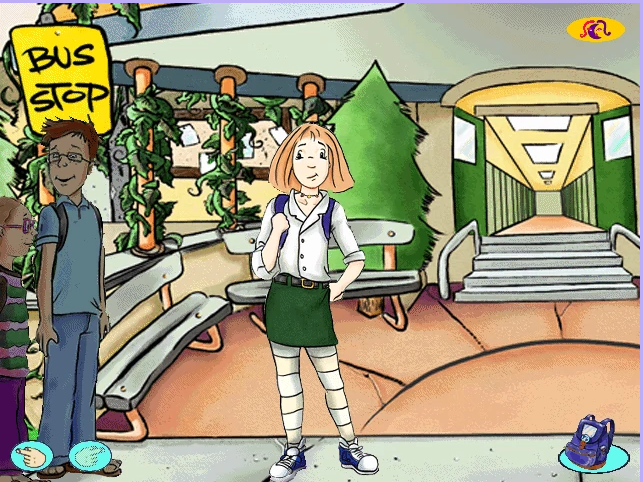All female gamers will remember playing Barbie games in their youth, maybe My Scene, Bratz, or any other girlie game they can think of before they reached a certain age and got into the games that weren’t casual about fashion and whatnot, but one of the most forgotten gems in girlie game history is the one and only Rockett.

Developed by a small company called Purple Moon for girls in elementary and middle school: the Rockett series is like a visual novel in junior high where the titular character makes choices that affect the plot.
You can also take pictures, read characters’ thoughts and go through their lockers to discover secrets that changed or expanded as the story unfolds.
The most dominant element in the games are the choices Rockett has to make at certain intervals, and they are often mood-based: does she react angry, happy or sad, to something that occurs?
I first saw these games played at a friend’s house, and then my parents got me all of the CD-ROMs in the series in a box set the following Christmas. I played all of them but, only one of them would just not work on my family’s ancient computer back in the day!
I found myself often making the same choices, given my rigid attitude back then. For example, in Rockett’s Tricky Decision, I chose to make her attend and stay at Nakili’s Halloween party because it seemed like a more welcoming place than Max’s, where all the popular kids went, even if the latter’s party had a band playing there. It didn’t take me long to realize that Rockett has a crush on the guy who’s the leader of that particular band!
When I look back at Rockett’s Secret Invitation, it was all about her choosing to become part of a clique that she was invited to. Of course, she’s reluctant because this particular clique is of three girls who are all Sagittarius but, she isn’t, she’s actually a Cancer! In the end, no matter what choices I made, Rockett never joined the clique and realized that she was better off on her own making friends with everyone. I mean, that is better right? Why should you just be in a group where you can only hang out with the people in it?
Some outcomes gave me the best results, like in Rockett’s First Dance, the choices I made suddenly led to her being crowned Queen of Hearts at Valentine’s dance, but the king was a guy who likes her but, she’s obviously not into.
However, she made up for it by getting to share a dance with the guy she does like and, we never know where the relationship goes from there because I think that was the last installment Purple Moon made before it dissolved in 1999 after being bought out by Mattel. The founder, Brenda Laurel stated that:
“In a way, the need for the kind of cultural intervention we made with Purple Moon no longer exists, in that girls and women are full participants in the world of computer-based interactivity, but we still have a problem with female designers getting their work out there. And there are many genres and areas of interest for girls and women that remain untouched. Heroes like Tracy Fullerton (USC), danah boyd (now at Microsoft, I believe), Justine Cassell (Northwestern) and Henry Jenkins (founder of the Comparative Media Studies program at MIT and moving now to USC) keep the flame burning for women in gaming.
Retrieved from Wikipedia Purple Moon page
The Purple Moon games, including Rockett, received some criticism for prolonging gender and ethnicity stereotypes. I didn’t notice this as a kid, but now I do. For example, one of the characters, Arnold, gets that stereotypical geek looks: glasses, messy hair, acne, etc. Not all people with geeky interests like comic books and video games look like that and, not all people with that kind of appearance have geeky interests. Unfortunately, we are often the types of people nobody wants to be around in school, but it can still be a problem in adulthood.
The ethnicity part was harder to notice, so I would have to find a way to replay these games to really take note of it. I think it’s safe to say that Laurel wanted to recognize that we need to stop perpetuating these stereotypes, especially myths that women and girls only like games like these.
But the biggest issue entailed here is reinforcing the myth that girls (especially younger ones) who like to play video games; only want to play games like these and that the gaming industry only wants to meet our needs by making such games. But women have a significant role in the gaming industry now and recognize that we can play the same things men play.
Still, this is definitely the most forgettable when it comes to those “girlie” games we grew up with, and I have so many memories with them, even if I made the same choices all the time and didn’t figure everything out in them.
👽Emily
Discover more from Monsterlady's Diary
Subscribe to get the latest posts sent to your email.



You must be logged in to post a comment.